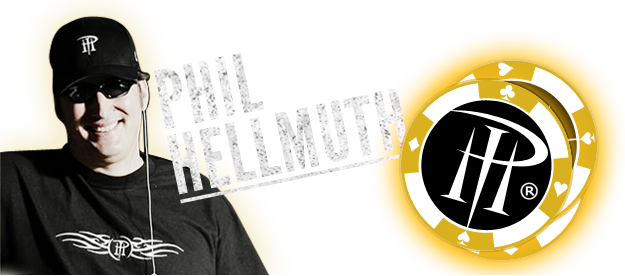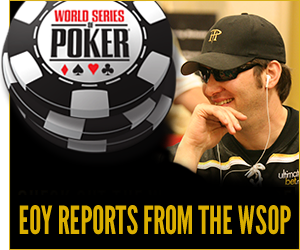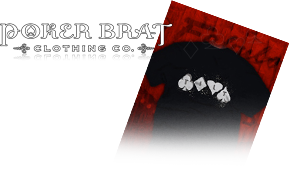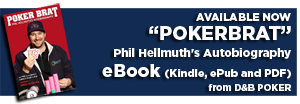-
Trying To Be The Greatest With 12
After winning my record-breaking 11th bracelet on June 11, I was walking all over cloud nine. But, as I write this, I’m still in the middle of the World Series of Poker (WSOP), and I want more!
On June 17, I entered the $3,000 buy-in no-limit Hold ’em event. Two days later, I was at another final table gunning for bracelet No. 12, and this one was an ESPN final table (to be aired in September).
To separate myself by two bracelets from the great Johnny Chan (10) and Doyle “Texas Dolly” Brunson (10) would be quite a feat. I just had to beat nine more players. The problem was that I was short-stacked, with only $213,000, when the average stack was $480,000 in chips.
A really interesting hand came up that people will talk about for a long time and ESPN will undoubtedly show repeatedly. With the antes at $2,000 a man and the blinds at $10,000-$20,000 — I had only $120,000 in chips remaining — I opened for $50,000 with K-6 off- suit. A player behind me reraised it to $200,000 to go. After giving a bit of thought, I folded my hand. You may be saying to yourself, “What was Phil thinking? He folded for his last $70,000 even thought there was $220,000 in the pot?” Why didn’t I call when I was getting laid over 3-to-1 on my money with king high? Simple, I thought that a better situation would come up in the next five hands.
I was roundly criticized by the table, and then I said, “Your criticism of me represents the way that the world thinks. I represent the way I think.” I then proceeded to pick up pocket aces the very next hand, and I opened for $40,000. The same guy that criticized my play, claiming that I didn’t understand the math was in the big blind with 7-4 offsuit. I said, “I know you’re going to call for the math.” And he did! When my pocket aces held up, I effectively tripled up and was back in the saddle.
Let’s take a closer look at the hands. First of all, I thought that I was at least a 2-1/2-to-1 underdog with my K-6. I thought my opponent might have Q-Q or A-K.
You see, the players at that table played with me the day before, and they had the impression that I was playing very patiently (because I was playing super patiently). My opponent thought that I had something (even though I didn’t), and he had to have a strong hand to reraise me. So I chose to fold rather than take the 3-to-1. I thought that I might get a better situation in the next five hands, and — who knows? — maybe even pick up a big pair (pretty lucky that!). I also reasoned that someone may make a weak raise when I had the blind while trying to steal it. This means that I would have a decent chance of winning the pot when I did have the big blind.
The last thing I thought about before I folded was this: my chips are always worth at least two times what everyone else’s chips are worth, so I was actually calling $210,000 (three times $70,000). The argument for the call is this: you’re getting 3-to-1 on your money, if you win you have $290,000 in chips, and you only have five hands left before you have to play for all of your chips! Why save a lousy little $70,000? Verdict: the call was probably right for most of the world, maybe even me. However, I wanted a chance to work a little “Phil Hellmuth magic!”
As far as the second pot goes, I did not like his “math call,” but it wasn’t a bad play. After all, he was in the big blind, and it would cost him $47,000 to put me all-in and look at five cards. Let’s take a closer look at the math: there was $20,000 in antes, a $10,000 small blind, his $20,000 big blind, my $20,000 call, my $47,000 raise (assuming that I put it all-in), which totals up to $117,000. So he can win $117,000 by calling $47,000 more. Thus the pot was laying him 2-1/2-to-1, and he had more than $500,000 in chips. The call was actually warranted for most players. But, I would rather save that $47,000, which I feel is triple value in my hands, for a better situation. Maybe I’ll use it when I have a huge hand, and I’m a huge favorite to win the pot. You never know when that $47,000 could come in handy down the line. I went on to finish in sixth place, but I’ll be back to another final table soon.
Calling for the “math:”
A) makes sense sometimes
B) is a tough deal
C) can backfire
D) all of the aboveAnswer: D
Related Posts
- Wisconsin ‘Homeboy’ Poker
- Win the War, Not All the Border Skirmishes
- Rock Stars Can Play, Baby!
- Layne Flack’s Close Call
- Blind’ed at HSP
- Gold Wins (Most Of) Record-Breaking HSP Pot
- I’m a Lucky ‘Bad Boy’
- Protect Your Pocket Eights With A Raise
- A Dirty Win to Start the New Season
- Chan Versus Phil: All-In, All Out, All Over
Recent Posts
- WSOPE 2nd place finish
- Update from this years WSOP 2019
- Happy Holidays! Updated stock at Poker Brat, new book!
- Phil Hellmuth wins historic 15th World Championship!
- Final golden ticket winner coming soon
- Poker Brat – The Phil Hellmuth Jr. Autobiography
- Phil Hellmuth’s “Pokerbrat” – Coming soon to audio book!
- Poker Night in America – Sugar House Casino
- Sugar House w Matt Glantz
- Lost and found
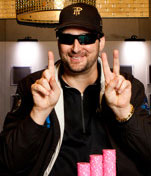
 ™
™



